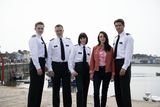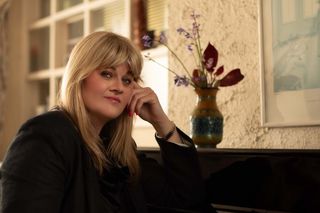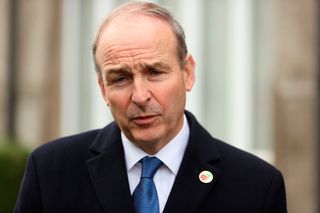Television review - Who we are now: a people 100 years in the making
* A Fanatic Heart (RTE1) * Centenary (RTE1)
Bob Geldof in his programme on WB Yeats.
It was a week of working out what it means to be Irish, and why that matters. Bob Geldof did it via the medium of WB Yeats, a man who knew a thing or two about mediums. It must be some kind of curse to Geldof that he is at his most brilliant and compelling, not as a musician, but as an analyst and commentator. He is just as good on Yeats and Irish nationalism as he is on debt relief. The punk sensibility that always seemed a bit self-conscious in his music is perfectly suited to re-animating the story of the poet and his relationship with Ireland.
RTE's two-part documentary A Fanatic Heart, written and presented by Geldof - with a wonderful mop of white hair that makes him look like a bleached Edward Scissorhands - starts with himself aged 14, contemplating the 50-year celebrations of the 1916 Rising. "Mawkish, emotional, nationalistic guff," is how he described it, instead finding his Ireland in the poetry of Yeats: "Here, I recognised immediately, was the country I belonged to."
And he's off, talking to a selection of academics, historians and other writers, including Roy Foster and Joseph O'Connor, as well as a great line-up of actors and celebrities - Richard E Grant, Colm Toibin, Edna O'Brien (with her own wonderful mop of coppery hair), Shane MacGowan, Tom Hollander, Stephen Fry, Dominic West, Bono - who read what is basically a Greatest Hits of Yeats's poetry.
The first part takes us from Yeats's birth to age 50, stopping on the eve of the First World War, with Ireland growing away from romanticism and towards militant Republicanism and commercial greed. The second part picks up at Easter 1916, moving on to the difficult birth of the State, and Yeats's battles against what Geldof describes as "the Catholic, clerical coup d'etat".
The script is terrific. This isn't the usual run of over-simplified concepts dumbed down for an audience with limited attention-span. Geldof has pitched it up, not down, giving us detailed, complex ideas delivered in robust, direct language. And, although certainly what they call an affectionate portrait, it's not a hagiography. Talking about Yeats's passion for Maud Gonne, his inveterate romanticising of her every act and word, Geldof asks Edna O'Brien: "Would you swoon and just shag him?" To which she responds, sweetly, "Probably, yes." Later, on the subject of 'Willie', as Geldof calls him with affection, finally losing his virginity, in his 30s, to Olivia Shakespear, who made him first buy a bed for the occasion, he says, "I don't know which was worse for Willie, the shopping or the sex."
Alongside the poetry and life story is plenty of Geldof's own analysis of blood sacrifice: "Dying is very easy," he says. "I've been around it a lot . . . staying alive is hard." Final analysis of Willie? "I think he was wilful, self-important, self-obsessed to the end . . . but was he capable of love? The man who wrote some of the greatest love poems ever imagined in the English language, possibly never understood what it was." Which is really rather devastating.
Centenary, created by Cilian Fennell, was another kind of Greatest Hits, of the history of modern Ireland, told through music, song and dance, intercut with stunning archive footage and audio taken from the last 115 years. Jack L, Imelda May, Sharon Shannon, Gavin James, the High Kings, Colm Wilkinson and Danny O'Reilly sang and performed in what was a major event - purpose-made for both TV and a live audience. At first sight, Centenary seemed a kind of Les Miserables with bodhrans. In fact, it was inventive, daring, evocative, profoundly moving in places, and unashamedly Irish, without a sneer or a sneaky apology in sight. The Twitter machine is not usually a thing given to celebration or consensus, preferring a strong vein of viciousness, but not this time. 'Best Thing since Riverdance' and 'made me proud to be Irish' was the general tone. Within the auditorium there was consensus too - standing ovations, and a whole lot of singing along.
Join the Irish Independent WhatsApp channel
Stay up to date with all the latest news














